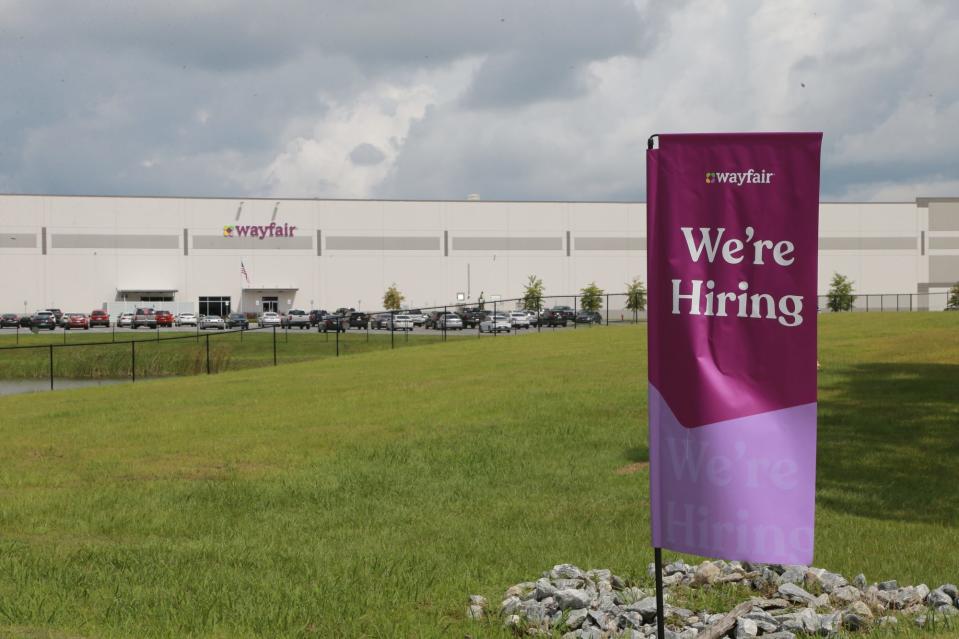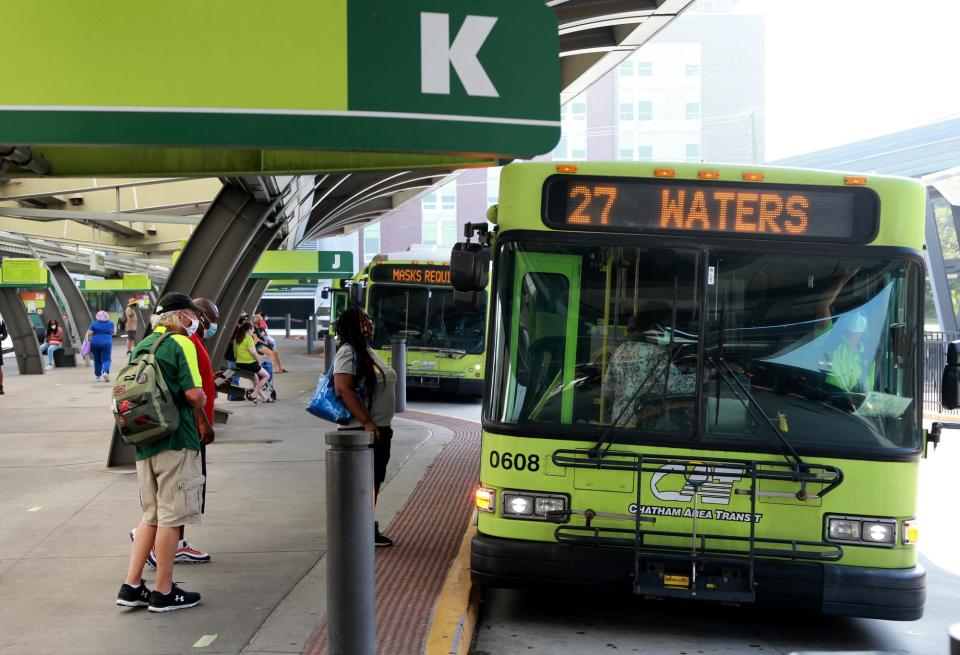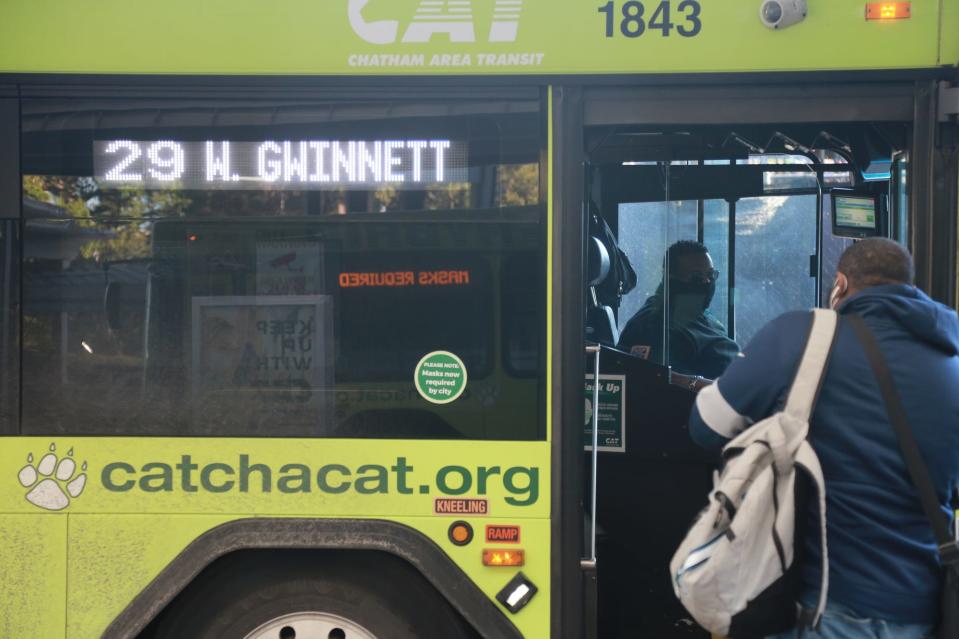Opportunity, jobs await workers at warehouses, ports in West Chatham. They have to get there first
Stepping into the midday sun, Kiairah Johnson couldn't wipe the smile off her face.
Kiairah Johnson and her family were gathered at Step One Automotive on Chatham Parkway, where she was gifted a brand-new Dodge Durango, a month of gas cards and a paid bill for her title, registration and taxes.
"When I got good news, I was just like, 'Are you sure? Me?'" Kiairah Johnson said at her giveaway. "It actually motivates me to do more and push for more."
Savannah news: Backlogged Savannah Port to see immediate relief funds from bipartisan infrastructure bill

Kiairah Johnson won the car after completing the Chatham Apprentice Program (CAP), a workforce development course from Step Up Savannah that prepares unemployed or under-employed Savannahians for high-wage jobs.
Kiairah Johnson is one of 1,600 graduates of the course, after which she received a part-time job offer to work at FedEx. Without a car or bus route, she had to rely on her grandmother to drive her to work. Somedays, she would have to call out because there was no way to get there.
"I found myself at that stage a lot of time where I was just like, 'I don't know how I'm gonna get to work.' I don't want to call out. I don't want to look like a bad employee when I'm not," the Groves High School senior said. "It's very difficult."
In America, 8.5% of households live without a car. In urban settings with reliable and frequent public transit or walkable neighborhoods, lacking a vehicle poses no problem. But in most cities and rural areas across the country, millions of families lack access to reliable transportation.

"If you can’t get to education, if you can't get to a polling place, if you can't get to a grocery store, you can’t thrive in life," said Steven Higashide, director of research for the New York-based Transit Center. "And when we don’t have effective transit, we are cutting off so many people from what it means to live and enjoy a place. Better transit helps break down all those barriers and really unlocks that access to a city."
Lack of transportation to jobs and services is one of two key factors keeping Savannahians trapped in extreme poverty, according to Step Up Savannah's Executive Director, Alicia Johnson (no relation to Kiairah).
Slow Ride: Still waiting for a bus? Driver shortage leads to service interruptions, modified routes
Of the CAP graduates who receive jobs, 36% have to turn down offers because of lack of transportation, according to the nonprofit.
"They’re forced to take low wage jobs in frontline industry," Alicia Johnson explained. "The higher wage jobs outside of our metro are off-limits to them."
Political action crucial to address needs
The boom of industrial growth to the west of Savannah in cities like Pooler, Port Wentworth and Bloomingdale offer thousands of jobs, many of which come with benefits, paid time off and higher wages than those found working in the hospitality and tourism industry.
The median wage for a Georgia worker in the tourism sector is $50,000, according to the Bureau of Labor Statistics. For logistics workers, median salaries rise to $72,000 a year, according to the BLS.

But without access to reliable or countywide transit, workers are trapped. A new vehicle costs nearly $50,000 once fees and taxes are factored in; Kelly Blue Book reports used cars now top $28,000 — 42% higher than in December 2019.
"Can people work? Yes, but they don’t have cars and they don’t have childcare," Alicia Johnson said. "It’s an issue we could really put our arms around as a community and move forward."
Read more: Funding raises the quality of Savannah-Chatham child care centers, but help still needed
Needs: A 'dire' situation: Savannah parents of children with autism have few child care options
Expanding Chatham Area Transit (the public bus system in the county) to all municipalities is "low-hanging fruit" to addressing this issue, Alicia Johnson said, but all parties need to be willing to work together.
"We have a TSPLOST being tossed around … if you want my penny, then I want my penny to go help that single mom or that child in Yamacraw Village," Alicia Johnson said.
TSPLOST is a referendum funded by a penny sales tax that is used for countywide transportation projects. The City of Savannah sought to leverage its position as the county's revenue source to get non-participating municipalities (Pooler, Port Wentworth, Bloomingdale, Tybee and Georgetown) to opt-in to CAT services, but negotiations stalled this spring. Chatham County Commission Chairman Chester Ellis still hopes to have the issue on the ballot this November.
Municipalities can opt-in to CAT services at any time, but it requires local funding.
TSPLOST referendum: may be pushed to November ballot after county, city officials spar
Alicia Johnson said it's going to take employers to force the issue, many of whom are setting up operations in Chatham County with promises of a mobilized workforce. Alicia Johnson said that workforce is ready, but immobilized.
"If we have enough people drawing attention to this issue of transportation justice and there’s enough people beating the drum, then it will come to (local government's) attention that our underserved communities need this," Alicia Johnson said.

The Savannah Economic Development Authority, the state authority who recruits many of the logistics and manufacturing companies to town, said they do not have any programs geared towards transportation for workers.
The Coastal Regional Commission uses their charter bus for rides in the 11-county Coastal Empire region it serves, but it's only during regular business hours and requires a reservation to be made in advance, leaving out evening- and late-shift workers.
New Leader: Taking the wheel: New Chatham Area Transit CEO talks priorities, stability and challenges
In the Georgia Department of Transportation's 2020 Executive Summary report, state officials recommended a roughly $500 million infusion into public transit outside of the metro Atlanta areas.
"It’s important to remember that public transit isn’t just an urban need," Higashide said. "The more rural a place is, the more likely their residents are to be elderly, have a disability or live in poverty. So there’s a bigger need for rural transit."
'Asset poverty' traps Savannahians
The poorest zip codes in Savannah lack access to countywide transportation, affordable childcare and the social circles that allow people to gain economic mobility. In these neighborhoods, Alicia Johnson said, "asset poverty" abounds.
Asset poverty is when an individual or household has "insufficient net worth to be able to meet basic needs without some form of income, meaning they have less than 90 days of emergency funds, no durable assets like a home or car or savings account, and no life insurance or retirement fund."

According to Step Up Savannah's research, a child living in one of the city's poorest zip codes — which includes neighborhoods such as Yamacraw Village, Kayton-Frazier Homes and the city's westside — is projected to earn a maximum salary of $19,000 a year by the time they're 35.
"They don't have equal access to countywide transportation, so we're essentially landlocking those folks into poverty," Alicia Johnson said. "The only jobs they can access are hotels, food vendors, that kind of thing, which don’t offer benefits that would improve quality of life."
Zoe covers growth and how it impacts communities in the Savannah area. Find her at znicholson@gannett.com, @zoenicholson_ on Twitter, and @zoenicholsonreporter on Instagram.
This article originally appeared on Savannah Morning News: Lack of transportation halts workers from West Chatham logistics jobs

